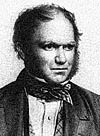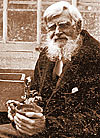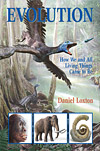In this week’s eSkeptic:
In this week’s eSkeptic, Jonathan Lowe reviews the film Darwin: The Voyage that Shook the World, produced by Creation Ministries International and Fathom Media, 2009. Novelist Jonathan Lowe is editor of TowerReview.com.
Film still and DVD cover below are from the film Darwin: The Voyage that Shook the World, copyright © 2009 Con Dios Entertainment Pty Ltd and Fathom Media. All rights reserved.

Distorting Darwin
a film review by Jonathan Lowe
IN A RECENT DOCUMENTARY FILM produced by Creation Ministries and Fathom Media, Charles Darwin is first admired as a curious and meticulous observer before his conclusions are then explained away. The movie has high production values, with live actors in period costumes, and impressive graphics. Subtitles appear in 18 languages. There is an air of authority about the docudrama, with the producer boasting that it “matches or exceeds” the quality produced by Hollywood films. Even the dismissal of Darwin’s theories comes on gradually, and is not hammered home, but rather casually discussed. Yet the conclusion is that modern science has since shown that Darwin erred, particularly about the length of time for geologic and biologic processes. The producers never consider, as most Christian scientists now accept, that the universe began with the Big Bang billions of years ago. Instead, a literal interpretation of Genesis is assumed, along with a young Earth. So several examples of localized glacial floods that Darwin somehow “missed” are cited in support of the Genesis account of a worldwide flood. Much is implied, since actual discussion would reveal no direct link in logic.
Just as the producers of Ben Stein’s film Expelled deceived interview subjects by not disclosing the true nature of the project, Fathom Media failed to inform three professional historians of science that this film about the subject of their professional study was actually an anti-evolution creationist tract. The three historians are noted Darwin scholars: Peter Bowler, James Moore, and Adrian Desmond. Not only did the producers not deny the charge, they admitted it was true. According to the CEO of Creation Ministries UK, Phil Bell, they established a “front company” called Fathom Media in order to convince experts such as Peter Bowler, who otherwise would not likely have agreed to be interviewed if they knew the film was an “overtly Creationist” production: “At the end of the day, [when] people see ‘Creationist’, instantly the shutters go up and that would have shut us off from talking to the sort of experts, such as Professor Bowler, that we wanted to get to.” Distinguishing between lies of commission and lies of omission, Bell explained that the interview deception was more of the latter: “Well, it could be called deceptive. But I think, at the end of the day … more people are concerned about how we’ve made a documentary, that’s a world-class documentary, clearly with wonderful footage, with excellent interviews, and balanced open discussion,” and that he had not violated the 9th commandment of bearing false witness against the historians because “Nobody was told any lies.” Right.
What follows are claims made in the film, followed by responses from scientists that I interviewed. Responding to the claims are John R. Hutchinson, Brian Charlesworth, and Nick Matzke. Dr. Brian Charlesworth is a Professorial Fellow at the University of Edinburgh. He obtained his Ph.D. in genetics at Cambridge, and was a postdoctoral fellow at the University of Chicago. He received the Darwin Medal of the Royal Society in 2000, and the Darwin-Wallace Medal of the Linnean Society in 2010. His research interests include population genetics, molecular evolution and genome evolution, and he has published over 200 research papers and three books. Dr. John Hutchinson holds a Ph.D. in Integrative Biology at the University of California, and earned a National Science Foundation bioinformatics Post Doc at the Biomechanical Engineering Division of Stanford University. He lectures in Evolutionary Biomechanics, and is an Associate Editor for the Journal of Theoretical Biology. Nick Matzke is a graduate student instructor in Integrative Biology and Evolutionary Biology at Berkeley, and holds degrees in biology, chemistry, and geography. He is former Public Information Director at the National Center for Science Education.
Claim: The chance of the four bar mechanisms of the human knee joint occurring by evolution is zero. There are too many changes that have to occur simultaneously.
John R. Hutchinson: “This ‘irreducible complexity’ argument makes numerous fatal flaws. An important one is that evolution proceeds by using old structures for new functions. It is thus a logical fallacy that the changes must occur simultaneously. Furthermore, the “four bar linkage” system of the “human” knee is seen (with subtle or striking variations) in virtually all land-dwelling four-limbed vertebrates (tetrapods), and so it is not an exclusively human feature. Our system shows subtle modifications of the general tetrapod theme that are specializations for bipedalism from a more primitive system of ligaments, but still reveals the community of descent in its common structure. Considering the similar (but varying according to function) morphological patterns in these ligaments, this is actually strong evidence for evolution.”
Claim: Darwin was influenced by books on geology postulating a long, slow process of deep time, and so he overlooked evidence that geological processes occur rapidly. He also transferred his pre-conception of deep time to geology. Today he would be disappointed by the evidence for his theory.
Hutchinson: “Of course some geological processes proceed swiftly but others, like continental drift (which Darwin didn’t know about but is important for evolutionary science today), have been proven (as much as science can prove things) to be painfully slow. To allege that Darwin would be unhappy about the current state of the evidence presupposes the assumption that all geological processes are fast. Thousands of expert geologists today would not agree with that statement, which would give Darwin succor, not lament.”
Claim: Darwin’s famous finches can be explained by climate changes with cycles longer than the short time of his observations. Finches’ beaks get bigger and smaller in reaction to climate over tens of years, not tens of millions.
Hutchinson: “Peter and Rosemary Grant’s studies since the 1960s of the finch populations have shown some slow and some “fast” changes as a result of (or correlated with) the local environment, but this in itself was not surprising. It is exactly what evolutionary theory predicts: rates will vary depending on environmental conditions. The recorded changes within finch species have been small relative to the changes that are inferred to have happened over thousands or millions of years between finches. Hence, observations have strengthened, not weakened, evolutionary theory.”
Claim: The genomes of plants and animals show much redundancy. This goes against the idea of randomness. There is an abundance of information that is utilized for adaptation, and this is unexplained by any selective mechanism.
Hutchinson: “This is a total non sequitur. Some redundancy is understood as gene duplication, which is a rather random event. Some makes sense as building safety factors against the loss of critical genes by genetic damage or error. It is not unexplained. It is completely reasonable in a modern evolutionary sense. Things that can be ‘utilized for adaptation’ cannot be ‘unexplained by any selective mechanism’ because the very process of adaptation involves selection.”
Matzke: “The genomes of animals and plants, at least those with large genomes like humans, are mostly junk. And whatever you’ve heard from creationists, or even certain poorly-informed scientists, saying that ‘junk DNA’ isn’t junk is mostly wrong. The fundamental fact supporting the idea that most DNA is basically junk is the fact that genome size in complex multicellular plants and animals varies hugely (~100 times smaller to ~100 times larger than the human genome), and doesn’t correlate with organismal complexity. Some ferns and salamanders have genomes dozens of times bigger than the human genome. Some fish are 10 times smaller. They all have roughly the same number and type of genes, and roughly equivalent complexity.”
Claim: The beauty of the peacock’s tail worried Darwin because it serves no function as camouflage, and a huge amount of genetic information went into creating the tail’s intricate structure. Darwin created the theory of sexual selection to explain why the tail feathers are so beautiful, but experiments have shown that females cannot detect some of the features, and none have any real effect on selection.
Hutchinson: “This is misconstruing a large body of research on sexual selection. As in any field of science some ideas have changed over two centuries, but sexual selection is still heavily favored as a major evolutionary mechanism. In some cases the targets of selection are counterintuitive, and females may choose traits that are not obvious or are indirectly correlated with obvious traits. But that is not a fatal flaw for sexual selection. It has just modified it. That evolutionary biologists and not creationists have discovered this information is rather telling. Creationists have contributed nothing to this area.”
Charlesworth: “There is indeed a large body of research confirming that female animals do favour males with ornaments such as the peacock’s tail, just as Darwin postulated. Sexual selection is one of the best documented phenomena in evolutionary biology.”
Claim: Darwin made the mistake of believing that layers of sediment and lava occurred in long ages in the Andes, when in fact the lava was injected in much more recent volcanic activity. Liquid rock was injected as parallel silt in preexisting soft sediment, negating the need for deep time.
Hutchinson: “Intrusions of volcanic material can enter into many younger/older rocks and confuse dating, but that does not pose any significant problem for the theory of deep time. It is just a methodological challenge for determining precise ages. A vast body of astronomical, paleontological, geological, chemical/physical, and other evidence overwhelmingly shows that the universe is billions of years old and the Earth about 4.7 billion years old. There is no convincingly contrary scientific evidence.”
Claim: Darwin believed that some races were inferior to the white race, which predisposed him to believe that some humans did not come from the same source.
Hutchinson: “This was the predominant view of many people worldwide at the time and probably since the dawn of human culture. It is a classic historiographic error to judge people of the past by today’s standards and not the standards of their time. It is thus no surprise that Darwin had some views that some today might consider racist. But compared against the cultural norm of the time Darwin was actually progressive, e.g. in disfavoring slavery.”
Charlesworth: “Darwin in fact proposed that all humans originated in Africa from a common ancestor with chimps and gorillas. Modern research in paleontology and genetics has confirmed this view, with many fossil intermediates between apes and humans, and a high degree of DNA sequence similarity among modern humans that shows that they shared a common ancestor much more recently than their common ancestor with apes. Given the record of racism and slave-ownership among creationist Christians in the U.S. and elsewhere, it is unfair to point to some remarks of Darwin about inferior races. In his autobiography, Darwin mentions his friendship with a black taxidermist in Edinburgh, whom he describes as an intelligent and pleasant person, and of course he abhorred slavery.”
Claim: The argument for evolution is circular, and full of errors. Naturalism is a paradigm of philosophy and there is no quarrel between religion and science — the quarrel is between naturalism and science.
Hutchinson: “This trots out some old chestnuts of creationism that have been thoroughly demolished in the past by scientists and philosophers. Evolution is descent with modification. That is not circular. The claim is idle semantics at best. Science does not work except in a naturalistic paradigm, so the two are inseparable. What happens between religion and science/naturalism is up to the individual to decide.”
Charlesworth: “Biologists study evolution in exactly the same way as other scientists deal with historical phenomena. They examine the available facts concerning what contemporary processes could operate to explain them on the assumption that these would have operated in much the same way in the past as in the present (just as we all assume the sun will rise tomorrow), and see how well they explain the historical patterns. This works amazingly well. In the Origin of Species, Darwin provided a whole series of facts about biology that make perfect sense in the light of evolution — descent with modification. Subsequent research has thrown up a huge number of others. Any of these can of course be explained as an arbitrary whim of a Creator, so creationism can never be falsified, in contrast to evolutionary hypotheses. In addition, the mechanism of evolution by random mutation and natural selection (and some other processes unknown to Darwin) is a typical scientific theory, which has been receiving ever-increasing support over the 150 years since Darwin. Any good book on evolution lays this out. The creationists disparage evolutionary biology because it conflicts with their religious beliefs, and they are simply not prepared to face up to the evidence. While there are plenty of open questions, and the accepted interpretations of many specific phenomena have changed over the years, this is true of even the most solidly established sciences such as physics. Science would grind to a halt if we had complete explanations of everything. Appealing to non-natural processes to explain away difficulties simply means you are not doing science.”
Skeptical perspectives on Charles Darwin
-
 How Darwin Became an Agnostic
How Darwin Became an Agnostic
(DVD $23.95) with Dr. Mario di Gregorio
-
 In Darwin’s Shadow
In Darwin’s Shadow
(DVD $23.95) by Michael Shermer
-
 Evolution: How We and All Living Things Came to Be
Evolution: How We and All Living Things Came to Be
(hardback $18.95) by Daniel Loxton


film still from The Passion of the Christ
NEW ON SKEPTICBLOG.ORG
The Passion of Saint Mel (Gibson that is)
In this week’s Skepticblog, Michael Shermer discusses Mel Gibson, anti-Semitism and Holocaust denial.










